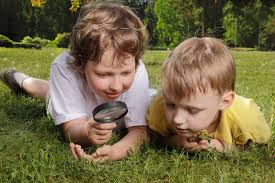by Christopher Perrin, PhD | Nov 22, 2013 | Articles, Seminars & Lectures, Videos

Josef Pieper in his book Leisure The Basis of Culture says that education (philosophy and poetry for that matter) begins in wonder. Kevin Clark and Ravi Jain in their new book, The Liberal Arts Tradition, also note that in the classical tradition, education moves from wonder to worship to wisdom (the three W’s of classical education). Can a student truly be a student if she is not compelled to wonder at the startling world into which she was born? A. G. Sertillanges (in The Intellectual Life) says,
Every intellectual work begins by a moment of ecstasy; only in the second place does the talent of arrangement, the technique of transitions, connection of ideas, construction, come into play. Now what is this ecstasy but a flight upwards, away from self, a forgetting to live our own poor life, in order that the object of our delight may live in our thought and in our heart.
Now by ecstasy, Sertillanges is appealing to the literal meaning of the Greek word ecstasis, which means to be lifted up and out of the ones “station” or the place where one is fixed, standing. Children are naturally set to wonder and delight in truth, goodness and beauty–and they are easily cultivated to continue in wonder. Do we really have a student, if he is not still wondering at the cosmos? The Latin studium (from which student is derived) means eagerness, zeal, enthusiasm, even fondness and affection. We could argue that without zeal and affection for truth, goodness and beauty, without love for the lovely–a student cannot truly be a student.
For what it is worth, I explore this theme in the following webinar, recorded and available here: Education in Wonder and Curiosity Webinar
by Christopher Perrin, PhD | Apr 11, 2013 | Seminars & Lectures

I have started offering some “webinar” training using Google’s live broadcast service (Google Hangouts)–and so far the approach is working fairly well. Readers of this blog can access this training by following the link below to my Google Channel. Currently, I have two training sessions archived–one on how to teach the informal fallacies and another on how to teach Latin to students in grades 2-6. Here is the link to those training sessions (each about an hour long):
Christopher Perrin’s Google Broadcast Channel
Yes, everyone can now broadcast via their own channel, giving CBS, ABC and NBC a real run for their money….
by Christopher Perrin, PhD | Jul 31, 2012 | Articles, Seminars & Lectures
 Below is a small article I wrote when I served as a classical school headmaster… and following is an audio seminar I often give on this subject of loving what must be done. I hope it may be of some use to classical educators here and there. –CP
Below is a small article I wrote when I served as a classical school headmaster… and following is an audio seminar I often give on this subject of loving what must be done. I hope it may be of some use to classical educators here and there. –CP
I am sure that most of you, like me, have fought hard to overcome a perpetual desire to relax and procrastinate when important tasks loomed. Those of you who have never battled with procrastination–well, your problems are obviously of another sort. In college, I recall several who transformed the practice of putting things off into art. Do you remember the guy in your dorm hall who wouldn’t begin his term paper till the night before it was due–and somehow still got an A? These types make it tempting for all of us.
The etymology of procrastination is worth examining: the word comes from the Latin pro ( forward, on behalf of) and cras (tomorrow). Therefore, at its root, the word means pro-tomorrow. Remember the maxim of the slacker: Why do today what you can put off until tomorrow? In contrast, we find encouragement of a different sort that may have originated from the German poet Goethe (I am still trying verify the citation): Cease endlessly striving for what you would like to do and learn to love what must be done.
I can sure do with a little more Goethe; and I am forced to reason that my children must need his advice, too. Many voices call for our attention–and not all of them bad. Sure, there are the typical scoundrels calling for us: hours of mindless TV programs, on-line surfing and chit-chat and other forms of “entertainment” that do little to exalt our minds or souls (no wonder Christopher Wren called TV “chewing gum” for the eyes). There are some good TV programs available too–some unusually good programs on the History Channel. We must admit, too, that amidst the ocean of drivel on the internet there are some exceptionally good sites and resources. Rejecting good things for what is best can be sorely difficult–should the family stay home tonight or take off for a church service or activity?
Finding a routine helps–for the routine answers the questions before they come up. Yes, we are going for a walk this afternoon–we always do. Yes, we will start homework after dinner–that is our routine. Crafting the routine, of course, is not necessarily easy. I know many of you have great, thoughtful, tested and re-tooled routines (could you send me a copy?). Some of you with younger children (or maybe only one young child) are probably still working on crafting your family rhythm and pattern. Establishing a routine that works well is an ongoing enterprise, that keeps answering the question of what must go, stay or be added.
Once we have created a workable routine, another challenges becomes clear. How do we maintain momentum, energy, stability and peace? At least part of the answer comes from Goethe: we should love those things we must do. Once our daily tasks become beloved tasks, the routine become less routine. This, I believe, is something we can pass on to our children, like an attitude, for Goethe is encouraging a mindset not an activity. If they see some measure of joy as we cook, clean, mow and repair, they are apt to find it easier to love (in a manner of speaking) clearing their plates, bathing and doing homework. Strange as it is, they usually grow up to be like us.
Education, after all, is largely a matter of routine. Nothing is mastered without regular visitation, review and study. And education never stops. If we can, we should cast the work our students do at CCA as a labor of love, a life-long love, and we should love what they do too. Education will have its high moments, its epiphanies, break-throughs and moments of joy–much like a marriage. But the larger tranquility of a good education comes from it regular labor of worksheets, translations and reading assignments, in the same way a good marriage grows on preparing a meal, raking the lawn and taking a walk.
Once we have created a routine and learned to love it, we can also find yet even further comfort in knowing that a regular part of our routine must be to break from it. We call these breaks of routine by various names, such as “dinner out,” “week-ends” and “vacations.” These can be holy days in their own right, those special routines that are special largely because they are not daily, and because they are a ritual of celebration. And we celebrate with the most poignant joy when our work is done (the hay is in the barn, the homework is all done–let’s go to dinner). Put another way, when we work well, we rest well.
Click the play button below to have a listen to the seminar.
by Christopher Perrin, PhD | Jun 9, 2012 | Seminars & Lectures
 In the past two years on the speaking circuit, I have given about six different talks on classical education. Of these six, one of them consistently hits a nerve–the talk entitled “The Lighter Side of Education: How to Relax, Enjoy and Laugh And Still Be A Parent Educator.” This talk always draws the biggest crowds and the strongest response, and I think it is because most of us pine for levity in our lives that are typically filled with American frenzy. I recently heard John O’Donahue (in an interview) say that stress is a distorted relationship with time, and no doubt most us struggle to get time right. In this talk I call forth Chesterton who says a man should take his mission but not himself seriously, and that angels can fly because they take themselves lightly. For what it is worth, I thought I would post this talk for my readers. Click the play button below for a listen.
In the past two years on the speaking circuit, I have given about six different talks on classical education. Of these six, one of them consistently hits a nerve–the talk entitled “The Lighter Side of Education: How to Relax, Enjoy and Laugh And Still Be A Parent Educator.” This talk always draws the biggest crowds and the strongest response, and I think it is because most of us pine for levity in our lives that are typically filled with American frenzy. I recently heard John O’Donahue (in an interview) say that stress is a distorted relationship with time, and no doubt most us struggle to get time right. In this talk I call forth Chesterton who says a man should take his mission but not himself seriously, and that angels can fly because they take themselves lightly. For what it is worth, I thought I would post this talk for my readers. Click the play button below for a listen.
[podcast]https://insideclassicaled.com/wp-content/uploads/2012/06/Audio_The_Lighter_Side_of_Education.mp3[/podcast]











